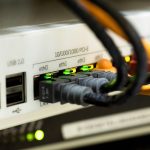USB hubs and docking stations both enhance your device connectivity but serve different purposes. Hubs simply increase USB ports for basic device connections, while docking stations offer multiple ports (like HDMI and Ethernet) and provide power delivery to charge devices. If you need more than just extra USB ports, a docking station is the way to go. Curious about how each can optimize your workspace? There's more to explore on this topic!
Table of Contents
Key Takeaways
- USB hubs expand the number of USB ports, while docking stations connect laptops to multiple peripherals like HDMI and Ethernet.
- Docking stations provide power delivery for charging, unlike most USB hubs that rely on device power.
- USB hubs are suitable for low-energy devices, whereas docking stations support high-resolution video output and faster data transfer speeds.
- Docking stations offer an ergonomic setup by elevating laptops, while USB hubs focus on managing multiple device connections.
- Choose USB hubs for basic connectivity needs; opt for docking stations for comprehensive solutions and enhanced workspace organization.
Understanding USB Hubs
When you need to expand the number of USB ports on your device, understanding USB hubs becomes essential. A USB hub connects multiple USB devices to a single port, letting you easily manage peripherals like keyboards, mice, and external drives.
These hubs come in powered and unpowered varieties. Powered hubs draw additional power from an outlet, ensuring even high-demand devices function smoothly. Unpowered hubs rely on your device's power, making them suitable for low-energy devices.
When choosing a hub, consider the number of ports, data transfer speeds, and compatibility with your device. With the right USB hub, you can streamline your workspace, enhance productivity, and keep your devices organized without constantly unplugging and replugging connections.
Exploring Docking Stations
USB hubs are great for adding extra ports, but if you're looking for a more comprehensive solution to connect multiple devices, docking stations might be what you need.
For a robust solution to connect multiple devices, consider upgrading from USB hubs to docking stations.
They offer versatility and functionality that can enhance your workspace or travel setup. Here are three key features of docking stations you'll love:
- Multiple Connections: Docking stations often include ports for HDMI, Ethernet, and USB, allowing you to connect monitors, printers, and more with ease.
- Power Delivery: Many docking stations can charge your laptop while connected, reducing cable clutter.
- Ergonomic Design: They often elevate your laptop to a more comfortable viewing angle, promoting better posture.
With a docking station, you can streamline your workspace and boost productivity effortlessly.
Key Differences Between USB Hubs and Docking Stations
While both USB hubs and docking stations expand your connectivity options, they serve different purposes and functionalities.
USB hubs primarily focus on increasing the number of USB ports available for connecting multiple devices. They typically don't provide additional power or advanced features.
On the other hand, docking stations are designed to connect a laptop or tablet to multiple peripherals while often providing power to the device. They usually include ports for HDMI, Ethernet, and audio, allowing you to create a more desktop-like experience.
If you need basic device connectivity, a USB hub suffices. However, if you're looking for a more comprehensive solution that integrates multiple connections and charging, a docking station is the way to go.
Use Cases for USB Hubs
For anyone looking to connect multiple devices without the need for advanced features, USB hubs offer practical solutions in various scenarios.
Here are some ideal use cases for USB hubs:
- Home Office Setup: If you've got several peripherals like a printer, scanner, and external hard drive, a USB hub can keep your workspace tidy and organized.
- Gaming: When you want to connect controllers, headsets, and other gaming accessories, a USB hub allows you to manage multiple connections easily.
- Travel: If you're on the go, a compact USB hub can help you connect multiple devices to your laptop or tablet, ensuring you stay productive without clutter.
Using a USB hub makes your tech life simpler and more efficient!
When to Choose a Docking Station
When you need more than just basic connectivity, choosing a docking station can significantly enhance your setup. If you often connect multiple devices, like monitors, external drives, and peripherals, a docking station provides the ports you need.
It's perfect if you're using a laptop as your primary device, allowing you to easily switch between working at your desk and on the go.
Additionally, if you require advanced features like video output in high resolutions or faster data transfer speeds, a docking station is the way to go. They also offer charging capabilities, so you can power your laptop and devices simultaneously.
Frequently Asked Questions
Can I Use Both a USB Hub and a Docking Station Simultaneously?
Yes, you can use both a USB hub and a docking station simultaneously. Just connect the hub to one of the docking station's ports, expanding your connectivity options for devices and peripherals seamlessly.
Are USB Hubs Powered or Unpowered Devices?
USB hubs can be powered or unpowered. If you need to connect multiple devices without draining power, a powered hub's your best bet. Unpowered ones rely on the host device for power, which might limit functionality.
Do Docking Stations Support External Monitors?
Yes, docking stations support external monitors. You can connect multiple displays, enhancing your workspace. Just make sure your docking station is compatible with your device and the monitors you want to use for optimal performance.
What Brands Are Recommended for USB Hubs?
When choosing a USB hub, you might consider brands like Anker, Sabrent, and Aukey. They're known for reliability and versatility, ensuring you've got the connectivity options you need for your devices.
How Do I Troubleshoot Issues With My USB Hub?
To troubleshoot your USB hub issues, start by disconnecting and reconnecting it. Check for loose connections, try different ports, and ensure your drivers are updated. If problems persist, test the hub on another device.




